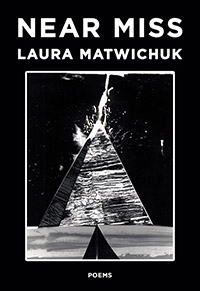Reviews
Poetry Review by Bardia Sinaee
Laura Matwichuk, Near Miss (Gibsons: Nightwood, 2019). Paperbound, 96 pp., $18.95.
 For better or worse, intelligence is irrepressible. It’s given us music, vaccines, puns, and space travel. It has also wrought thermonuclear bombs and generalized anxiety. Vancouver-based poet Laura Matwichuk seems like the kind of person who can think a small itch into full-body hives. But that characterization is unjustifiably personal. Let me rephrase it: the speakers of the poems in Matwichuk’s debut, Near Miss, all share an acute intelligence unfortunately predisposed to catastrophic thinking.
For better or worse, intelligence is irrepressible. It’s given us music, vaccines, puns, and space travel. It has also wrought thermonuclear bombs and generalized anxiety. Vancouver-based poet Laura Matwichuk seems like the kind of person who can think a small itch into full-body hives. But that characterization is unjustifiably personal. Let me rephrase it: the speakers of the poems in Matwichuk’s debut, Near Miss, all share an acute intelligence unfortunately predisposed to catastrophic thinking.
Take, for example, the opening of the collection’s title poem, one of five that use as a springboard a colour-coded scale for the collisional “threat value” (thank you, Wikipedia!) of asteroids and other near-Earth objects:
1,056 close-Earth approaches since 1900.
Somewhat close, we’re told, is not cause for alarm.
Yellow is neutral: beyond our control,
but not worrisome. I put fresh sheets on the bed
and wait. Today is February 4, 2011
and we are living our lives and not pretending.
This passage exemplifies the strengths of Near Miss. In clear, crisp syntax, the poem’s perspective and scale of time change rapidly. A slight phrase—“we’re told”—distances us from the probabilistic assurances of safety. As we arrive at the image of the bed on a precise date, the overall effect is disorienting and strangely inevitable. All throughout Near Miss, Matwichuk evokes the feeling of disaster, often without disaster taking place.
In the poem “Seismophobia,” the fear of earthquakes “Splits you in half, / morphs into hard chunks / behind your sternum.” The compressed lines and ungainly diction (“morphs into hard chunks”) render the fear of earthquakes as an earthquake-like affliction, but the conceit announces itself too loudly. By the second line, it’s obvious where this is going.
There’s an inverse relationship between control and anxiety in this collection, anxiety about what we can’t control, and whether the very notion is delusional. Numerous erasure poems elliptically describe news reports of planes nearly colliding with mountains or other planes. These poems beget an abundance of explanatory end matter. Others appear without a title on the page, but are listed in the table of contents under cryptic recurring titles like “Dream” and “Testimony.” Either title the poems or don’t. Flipping back and forth between the poems, the contents page, and the notes becomes a distraction. I recommend foregoing this contextual scavenger hunt the first time around to let each poem speak directly to the ones surrounding it.
My favourite pieces in Near Miss take an ambiguous stance on the rationality of fear. It’s not unreasonable to wonder, knowing we’re grounded on a rock hurtling through space at thirty kilometres per second, how we manage to go about our lives at all. Matwichuk balances catastrophic thinking with cautious hopefulness—not from the statistical unlikelihood of the proverbial Big One, but from the continuity of love through family. A memorable stretch features a first-person narrative piece about giving birth (“Fuji, Baby”) nested between poems of childhood and snapshots of a deceased mother (“Subalpine Wonders,” “After Your Funeral,” and “Shadow Puppets”). The cycles of life and death coalesce into a perpetual present in which two people whose lives did not overlap nevertheless nearly cross paths.
The poet most often speaks from an embodied first-person point of view. Even the exceptions, like a poem in which a black hole describes itself, seem to possess a familiar sense of self:
Nestled deep inside elliptical galaxy
NGC 4889, an egg-shaped swirl,
I sulk and wait, knowing what I know.
Whipped meringue monster
in a porcelain mixing bowl. (“Composite: Black Hole”)
In the collection’s final poem, a car hangs precariously over the edge of an open drawbridge, headlights pointed at the sky as “our hair fall[s] like a curtain into the back seat.” Rather than leaving us suspended there, Matwichuk tells us what happens: “Your eyes are telling me we should get used to this feeling, / leaning away from the earth / as the earth comes up to meet us.” It took a couple of readings for the unsettling precision of those lines to sink in for me. It’s not just that we’re falling; we see in “your eyes” the quiet horror of knowing we’re falling.
However, even this decisive moment is cast into doubt. The poem’s title is “Drawbridge [Dream].” And what if it is a dream? Matwichuk has it both ways here: something happens in this poem, but it isn’t real, though I’m not able to say what that means in terms of poetry’s constructed universe. Like the couple watching the news in “Inferno,” “We fall asleep / on the couch with only half an explanation / in our heads of how this happened.” The frequency with which Matwichuk sticks the landing in these poems makes Near Miss a remarkable debut. I strongly urge you to read this book, although not on a flight.
—Bardia Sinaee









